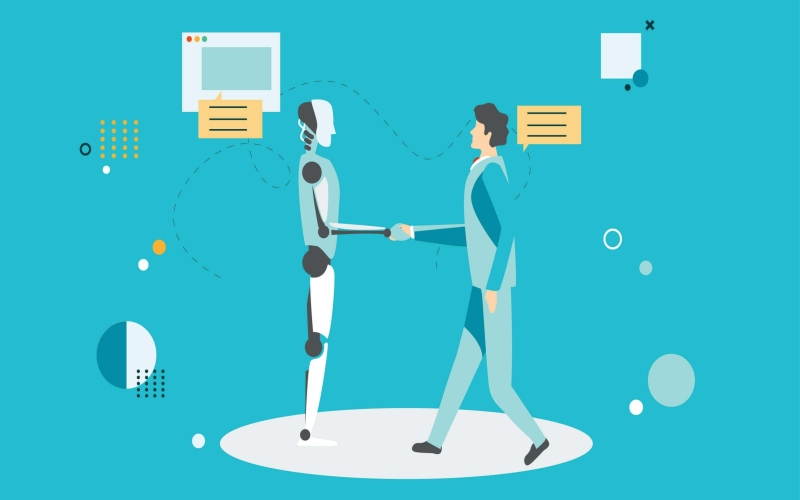Key Takeaways:
- AI-driven platforms are redefining the recruitment landscape, ensuring sophisticated job matching.
- These platforms offer a robust solution for diminishing biases and cultivating diverse and inclusive workforces.
- With predictive analytics, AI technology equips businesses to address their hiring needs preemptively.
Table of Contents:
- The Advent of AI in Recruitment
- AI’s Proficiency in Job Matching
- AI’s Decisive Role in Reducing Recruitment Bias
- Predictive Power: AI’s Impact on Recruitment Foresight
- Fine-Tuning Job Search and Applications with AI Technology
- Conclusion: The Journey Ahead with AI in Recruitment
AI is revolutionizing recruitment, ushering in a new era of efficiency and effectiveness. From streamlining candidate sourcing to enhancing assessment processes, AI technologies are transforming every aspect of talent acquisition. Embracing these innovations promises optimizing hiring outcomes, reducing bias, and unlocking unprecedented insights into workforce dynamics.
The Advent of AI in Recruitment
In the not-so-distant past, the recruitment process could have been more efficient, often beleaguered with inefficiency and subjectivity. However, the landscape is undergoing a revolutionary change prompted by new AI-driven recruitment technology. Leaders and innovators in this transformative wave, such as Martin van Blerk, are establishing AI-powered job search platforms that compete with traditional methods by offering more innovative, faster, and more precise matching between employers and prospective employees. The essence lies in AI’s ability to parse through information and identify compatible connections more rapidly and accurately than ever before, making it an indispensable tool in the contemporary recruiter’s arsenal.
AI’s Proficiency in Job Matching
The cornerstone of any successful recruitment platform is its job-matching precision. AI elevates this process substantially by integrating algorithms that understand nuances in job descriptions and candidates’ resumes. Leveraging pattern recognition, natural language processing, and machine learning, AI carefully dissects the experiences, skills, and roles to provide recommendations for employers not just on paper but primed for holistic fit within their organizational culture. The ripple effect of this matchup is profound – it contributes to better job satisfaction and higher productivity and reduces the costly turnover that plagues many industries.
AI’s Decisive Role in Reducing Recruitment Bias
Recruitment bias is an industry-wide challenge, and its consequences can ripple through an organization, hampering diversity and innovation. AI-powered recruitment platforms are designed to target this bias by strictly adhering to merit-based assessments. They operate on algorithms that systematically unfold the candidates’ qualifications while disregarding unrelated personal data that could influence a biased decision. By focusing on what truly matters – skills, qualifications, and experience – AI helps forge pathways to a more diverse workforce that reflects the talents and perspectives needed in a thriving business environment.
Predictive Power: AI’s Impact on Recruitment Foresight
Beyond matching jobs and candidates, AI’s true prowess reveals itself in predictive analytics. This aspect of artificial intelligence delves into accumulating and analyzing historical and real-time data to anticipate future hiring needs. This foresight empowers businesses to proactively scout for talent and strategically build their teams, preparing them for future demands. Instead of reactively filling positions, companies can use AI data analytics to develop a talent pipeline, smoothing out traditional hiring processes’ often reactive nature.
Fine-Tuning Job Search and Applications with AI Technology
AI is not solely beneficial for organizations; it’s also a boon for job seekers. AI-powered platforms refine the job search experience by tailoring job recommendations to align with the user’s skills, past application history, and nuanced preferences. The ability of AI to learn from user interactions means that the platform evolves alongside the job seeker, continuously fine-tuning and improving the relevancy of opportunities presented. For applicants, this means navigating a more curated pathway toward potential employment, replete with options that resonate with their career trajectory, skills, and aspirations.
Conclusion: The Journey Ahead with AI in Recruitment
As we traverse more profoundly into a world where AI intersects with critical facets of our daily lives, its symbiotic relationship with the job market is particularly impactful. Platforms like those developed by visionaries like Martin van Blerk offer a glimpse into a future where recruitment is not just about filling a vacancy but creating a meaningful and strategically aligned workforce. When used responsibly, this technology can reshape how we perceive job searching and recruiting – transforming it into a data-driven, unbiased, and opportunity-laden landscape that benefits all.

